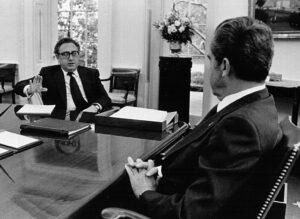Henry Kissinger and the seductions of power

President Richard Nixon meets with Secretary of State Henry Kissinger January 21, 1974 in the Oval Office. (Photo by National Archive)
by David Skidmore, Iowa Capital Dispatch
December 2, 2023
If, as the late Henry Kissinger once confided, power is the ultimate aphrodisiac, then few men have more fully or openly surrendered themselves to its seductions than America’s most celebrated (and reviled) statesman.
Throughout Kissinger’s century-spanning life, his thoughts and actions were rooted in a political philosophy called realpolitik. As a Jewish boy growing up in Germany, Kissinger witnessed the chaotic disintegration of the Weimar Republic and the rise of Nazism. This left him pessimistic about human nature, skeptical about the inevitability of progress, and deeply committed to the values of order and stability. To these ends, Kissinger viewed power, not moral ideals, as the driving force of history.
While serving under presidents Richard Nixon and Gerald Ford in the ’70s, Kissinger’s brand of realism often took brutal form. Amidst the Cold War, Kissinger saw every affront to American power as a Soviet-inspired test of U.S. resolve. Only an unblinking demonstration of strength could preserve American credibility.
This hard-nosed perspective lay behind Kissinger’s endorsement of the bombing and invasion of Cambodia, the Christmas bombing of Hanoi, the campaign to destabilize Salvador Allende’s government in Chile and U.S. aid to rebel factions in Angola.
Kissinger’s sometimes appalling moral blindness was evident in his long-held backing of the white minority regime in South Africa and his support for continued military assistance to Indonesia despite its bloody invasion and suppression of neighboring East Timor.
Nixon, of course, shared Kissinger’s fondness for realpolitik. Both embraced a paranoid view of the world that included, eventually, a large measure of distrust and jealousy toward one another. Nixon and Kissinger’s secretiveness, along with their contempt for both the Congress and the foreign affairs bureaucracy, were legendary.
A degree of secrecy and surprise may have been necessary to the success of some of the administration’s principal initiatives. If pursued openly through formal channels, it is unlikely that either the initial steps toward détente with the Soviet Union or the opening to China would have survived bureaucratic or congressional resistance.
Yet secrecy and the banishment of expertise each exacted their price. Relying upon his own backchannel to bypass the formal U.S. bargaining team, Kissinger bungled crucial aspects of the SALT I negotiations. In the 1971 India-Pakistan war, Kissinger insisted, against accurate State Department advice to the contrary, upon viewing India as a Soviet proxy. Kissinger’s subsequent tilt toward the brutal Pakistani regime had tragic consequences.
Nixon’s and Kissinger’s obsession with secrecy had other costs. Concerned about leaks, especially regarding the secret bombing of Cambodia, Kissinger ordered wiretaps placed upon his closest aides. Although not directly implicated in subsequent events, Kissinger’s frantic reaction to the release of the Pentagon Papers encouraged Nixon to authorize formation of the infamous Plumber’s Unit.
The paranoid atmosphere inside the Nixon administration often reached comical extremes. Cut off from vital information by Kissinger, Defense Secretary Melvin Laird used the National Security Agency to intercept Kissinger’s backchannel messages while Navy Chief of Staff Elmo Zumwalt placed a personal spy within Kissinger’s inner circle.
When not engaged in petty machinations, Nixon and Kissinger did manage to infuse U.S. foreign policy with a rare degree of intellectual and strategic vision. They sought to construct a structure of peace built upon the triangular relationship between the United States, the Soviet Union and China. Kissinger hoped that America’s pivotal role in this tripolar diplomacy would serve to constrain Soviet behavior while preserving U.S. power. The audacity and ingenuity of this attempt to rearrange the global balance of power was breathtaking.
Yet Nixon and Kissinger’s structure of peace lacked solidity. Domestic obstacles, including but not limited to Watergate, interfered with Kissinger’s grand geopolitical scheme. Kissinger oversold détente to the public and his instinctive secrecy and distrust of democracy eventually led to a backlash against his style of diplomacy. The nation turned first to Jimmy Carter’s moralism and later to Ronald Reagan’s ideological anticommunism.
While Kissinger often defended peace and order as moral imperatives in themselves, he never understood the desire of most Americans that their country stand for some set of higher ideals and purposes. Kissinger’s realpolitik proved out of sync with the American character.
Iowa Capital Dispatch is part of States Newsroom, a network of news bureaus supported by grants and a coalition of donors as a 501c(3) public charity. Iowa Capital Dispatch maintains editorial independence. Contact Editor Kathie Obradovich for questions: info@iowacapitaldispatch.com. Follow Iowa Capital Dispatch on Facebook and Twitter.












